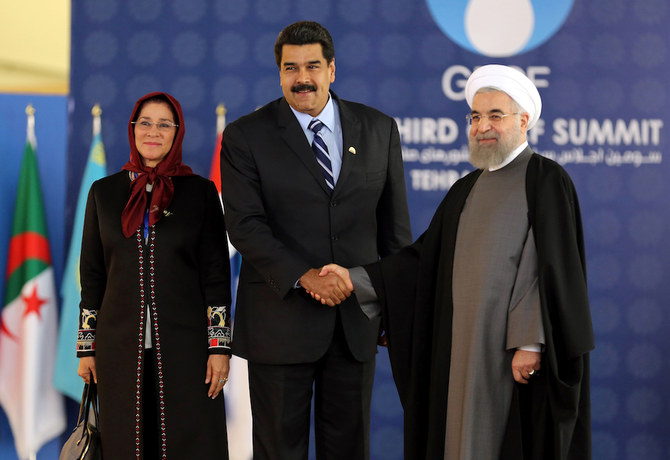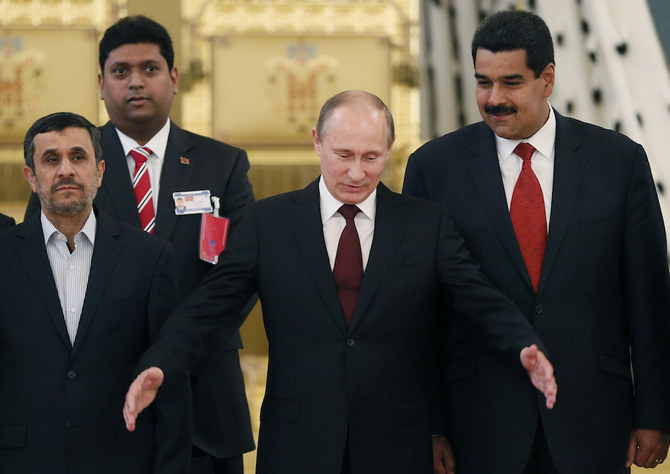RIYADH: One seldom-discussed byproduct of Iran’s Islamic Revolution, which ended with the fall of the Shah and the rise of Ayatollah Ruhollah Khomeini in 1979, is the diplomatic, economic and strategic collusion between Tehran and several Latin American regimes — right in Washington’s own backyard.
Tehran has worked hard to consolidate these friendships since the revolution, in particular its entente with fellow oil producer Venezuela during the presidency of Mahmoud Ahmadinejad between 2005 and 2013.
The Iranian regime has simultaneously intensified its efforts to reshape the international power dynamic in the Middle East and the wider region in its favor through an array of secretive military interventions and its illicit nuclear program.
To curb these geostrategic aspirations and malign activities across the region, the US has reimposed a raft of sanctions on Iran’s economy, leaving the regime isolated and financially crippled.
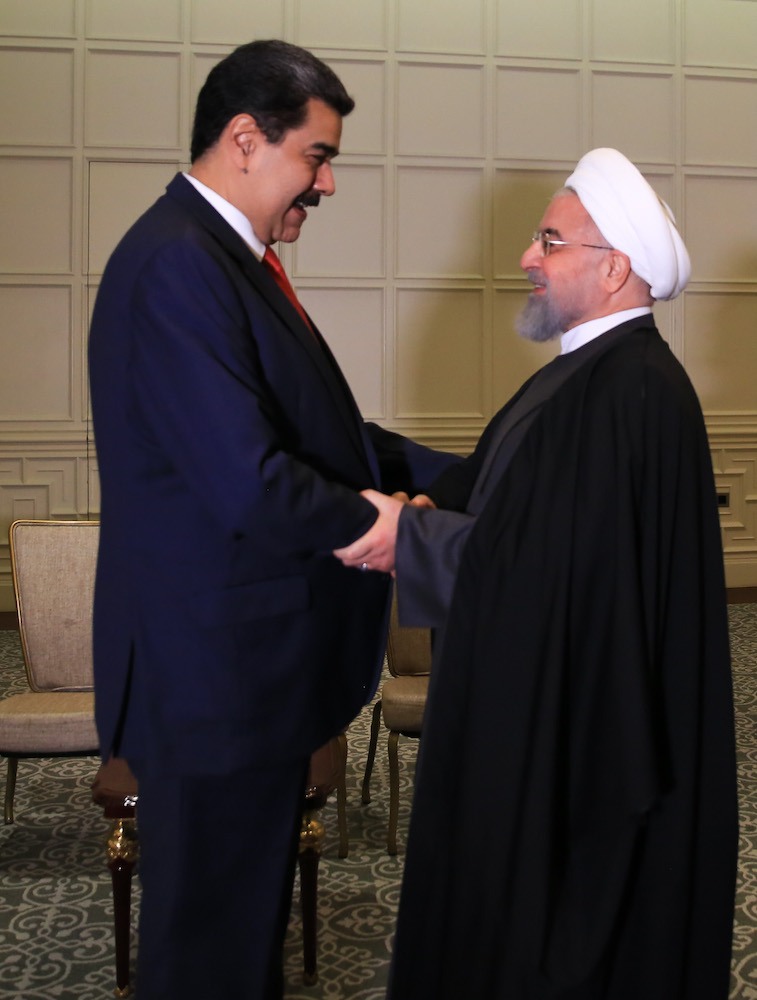
Venezuela's President Nicolas Maduro (L) shaking hands with Iran's President Hassan Rouhani (R) before a bilateral meeting at The Convention Centre in Baku on October 25, 2019. (AFP/Miraflores Palace Presidential Office/Jhonn Zerpa/File Photo)
From this position of weakness, Tehran has looked to its friends in Caracas — another international pariah — in search of dependable allies.
Tehran’s relationship with Latin America dates back to 1960, when Venezuela was among the founding members of the Organization of the Petroleum Exporting Countries (OPEC). From here, Iran’s diplomatic ties quickly branched out to include Brazil, Mexico, Argentina and Cuba.
But it was not until 2005, early in Ahmadinejad’s presidency, that the company Tehran was keeping in Latin America came under scrutiny. Several of these budding friendships appeared to be based on a mutual dislike for the US and its policies.
After the First World War, waves of refugees began to arrive in Venezuela from the Middle East. The trend gained more traction after the Second World War and reached a peak after the outbreak of the Lebanese civil war in 1975.
Iran and its Lebanese proxy militia Hezbollah exploited this trend, using religious and intellectual infiltration to convert Christians and Sunni Muslims to Shiite Islam and Khomeinist teachings on the Wilayat Al-Faqih (Guardianship of the Islamic Jurist).
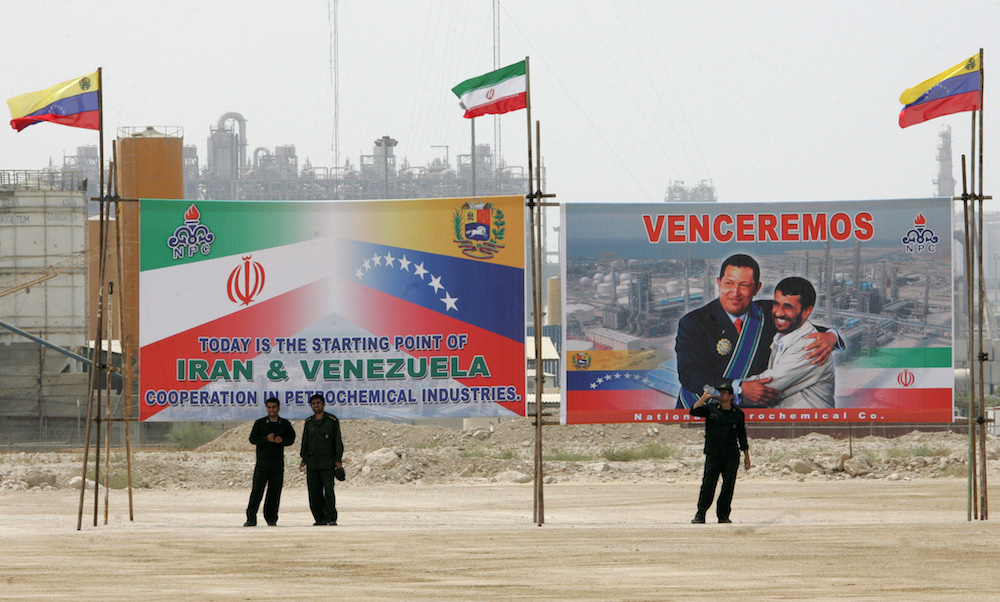
Iranian revolutionary guards secure the area during the inauguration ceremony of a joint petrochemical plant in the Asaluyeh industrial zone - where Iranian President Mahmoud Ahmadinejad and his Venezuelan counterpart Hugo Chavez sealed their anti-American alliance in 2007. (AFP/File Photo)
Keen to expand its ideological presence and confront what it viewed as Western hegemony, Iran launched a Spanish-language satellite news channel in 2011 called HispanTV, broadcasting a variety of cultural, political and religious programs targeting people across the continent.
Iran has established more than 36 Shiite cultural centers in 17 countries around the world, many of which are allegedly being used as spy rings to gather intelligence. In Latin America they act as a hub for recruiting expatriates and building popular support for Iranian policies.
After OPEC was established, political and economic relations between Iran and Venezuela were initially based on their shared oil production and price-related challenges. This relationship later flourished and expanded to include several Latin American countries through common membership of the Non-Aligned Movement.
Founded in 1961, the forum of 120 states, who do not consider themselves formally aligned with any major power bloc, claims to remain neutral and independent in world affairs.
Challenging the will of the international community, Venezuela has long hinted it will defy sanctions and supply Iran with petroleum products in an attempt to weaken US efforts to exploit Tehran’s dependence on foreign refined oil.
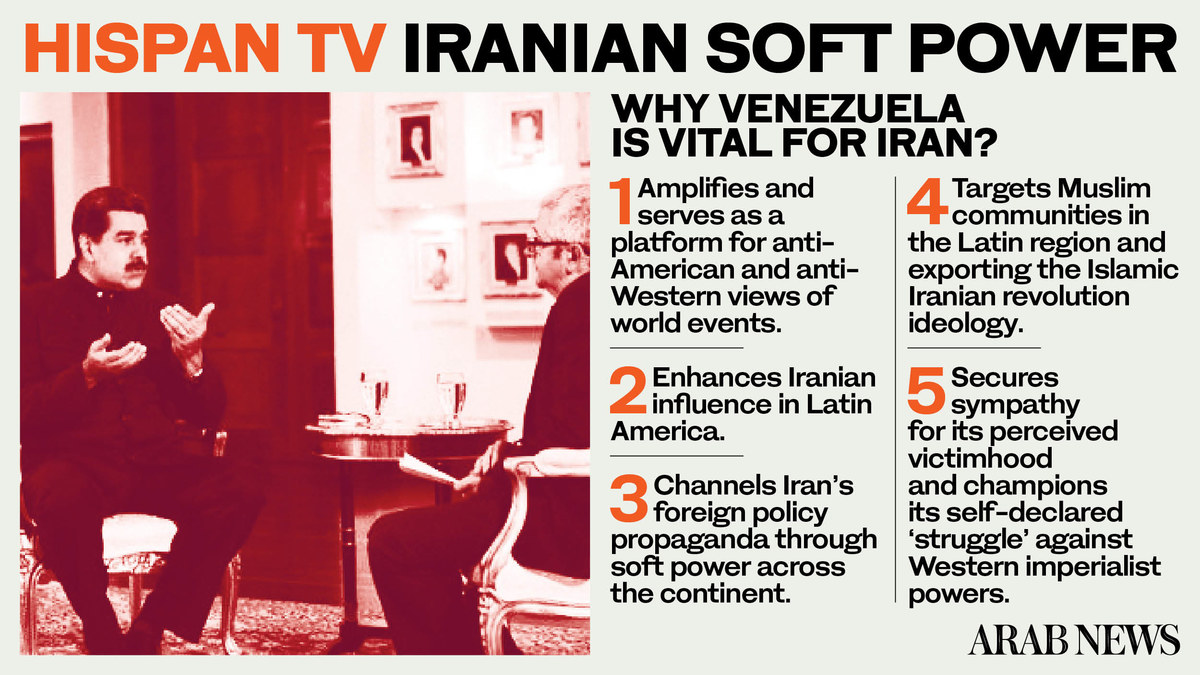
Nicolas Maduro, Venezuela’s socialist president, has maintained this stance since taking the helm following the death of Hugo Chavez in 2013.
Itself under a strict US embargo, Venezuela is grappling with its own economic crisis, causing unprecedented inflation and shortages of food, fuel and medicine. Despite possessing the world’s largest proven oil reserve, the nation’s gross domestic product (GDP) has nosedived and its currency has collapsed.
In December, Iran reportedly sent tankers loaded with gasoline and petroleum components to Venezuela in defiance of international sanctions. After the US imposed its latest round of sanctions on Venezuela in 2019, Iran also supplied Caracas with tools, supplies and technical expertise to support Petroleos de Venezuela, SA — the state-run oil and gas company.
Through its warm relations with Latin American governments, Iran hopes to project the image of a global power, overcome its political and economic isolation, garner diplomatic support for its nuclear program and respond to the US from close proximity.
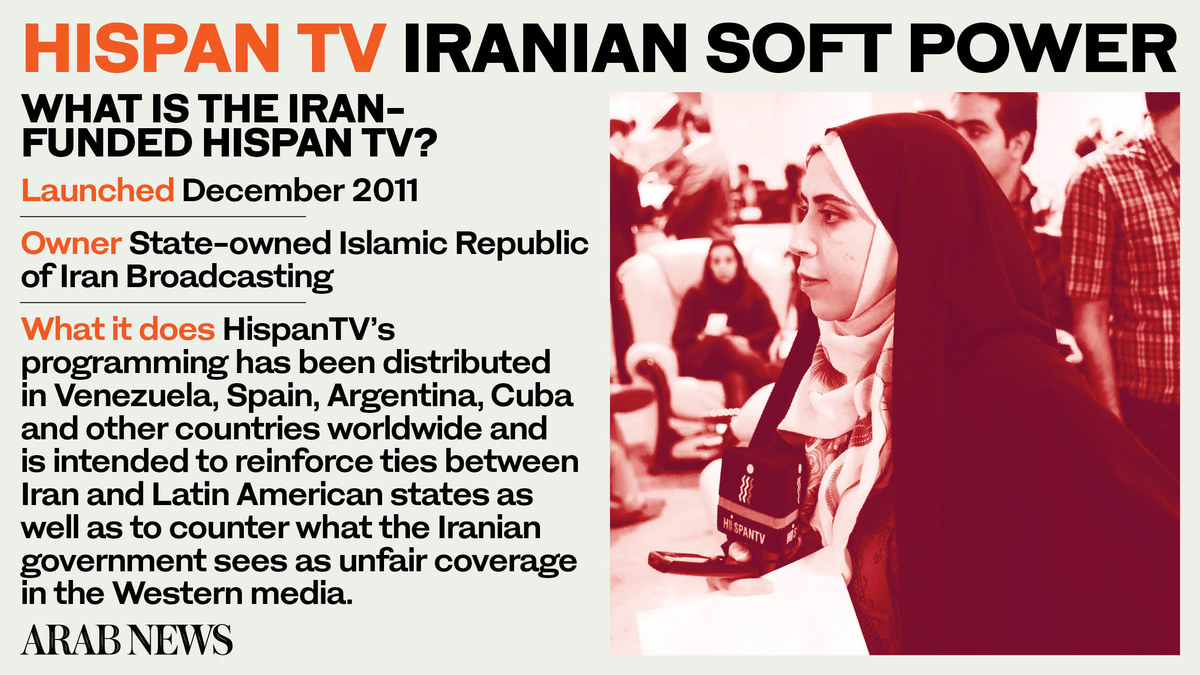
Venezuela’s former president Chavez strengthened his country’s ties with Iran during his time in office. In 2003, he appointed Syrian-Venezuelan Tareck El-Aissami to lead the Administrative Service of Identification, Migration and Foreigners (formerly known as ONIDEX), who is alleged to have used his powers to assist Hezbollah.
During a year-long joint investigation, CNN and CNN en Espanol exposed major anomalies in the issuance of Venezuelan passports and visas, including allegations that documents were issued to individuals with extremist ties.
According to intelligence reports, El-Aissami was involved in the issuing of 173 Venezuelan passports and IDs to individuals from the Middle East, including people affiliated with Hezbollah.
Venezuelan opposition groups also accuse El-Aissami of drug smuggling. He is listed by the US Treasury’s Office of Foreign Assets Control as one of the 10 most-wanted drug traffickers.
Since April last year, he has been working in Venezuela’s Ministry of Petroleum.
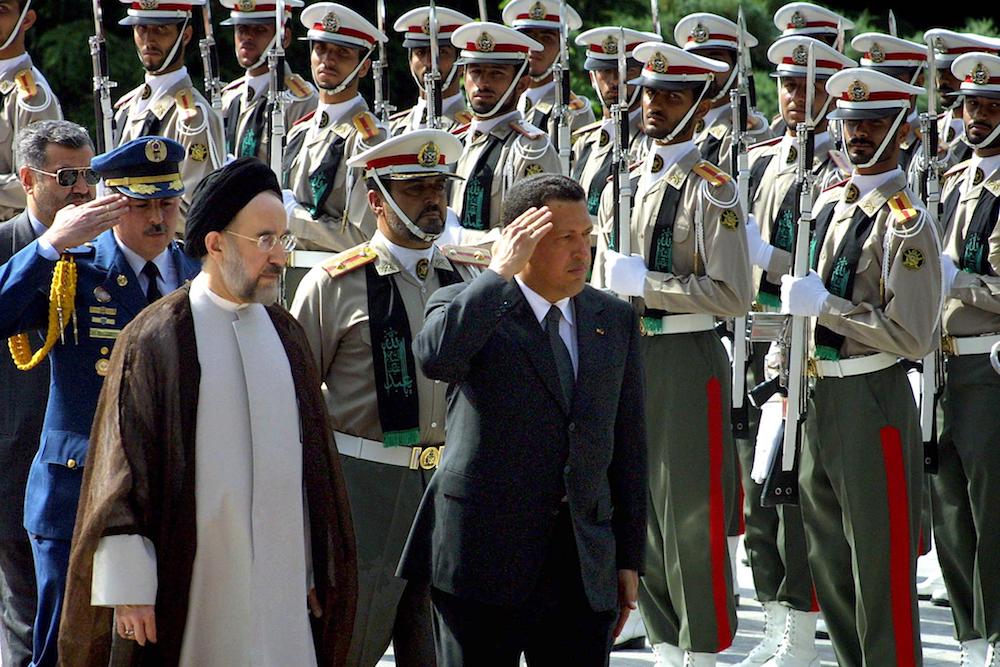
Iranian President Mohammad Khatami (L) and his Venezuelan counterpart Hugo Chavez review the honor guard during a welcoming ceremony in Tehran 20 May 2001. (AFP/File Photo)
In June 2008, the US Treasury named naturalized Venezuelans Ghazi Nasreddin and Faouzi Kanaan as supporters of terrorism. Nasreddin worked as charge d’affaires at the Venezuelan embassy in Syria and also held a position at the nation’s embassy in Lebanon.
According to the Treasury, Kanaan owned a travel agency, organized trips and raised money in Venezuela for Hezbollah members. It also says Kanaan met senior Hezbollah officials to discuss kidnappings and potential terrorist attacks.
According to a US State Department report on terrorism in 2019, Venezuela operates a lenient framework for armed groups, including FARC (Revolutionary Armed Forces of Colombia) rebels, the Colombian National Liberation Army (ELN), and members of Hezbollah.
The report says financial ties with FARC and ELN rebels have helped enable repression and graft schemes carried out by the Maduro administration.
Hezbollah has established close ties with drug-smuggling rings and has developed a sophisticated money-laundering scheme. An article published by Politico in 2017 revealed Hezbollah has made $1 billion annually from drug- and weapon-smuggling, money-laundering and other criminal activities.
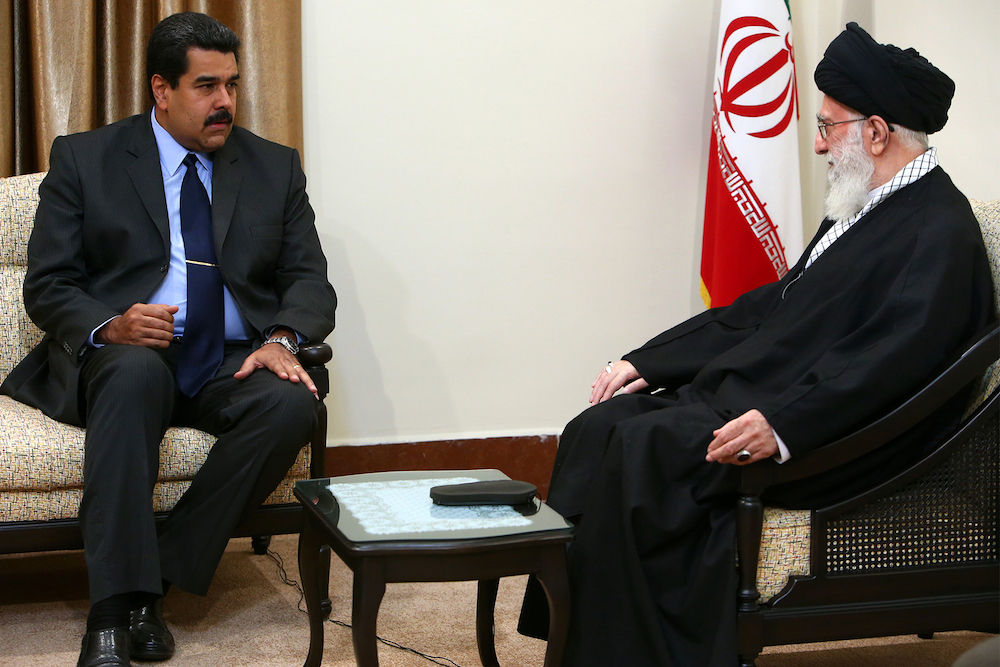
A handout picture released by the official website of the Centre for Preserving and Publishing the Works of Iran's supreme leader Ayatollah Ali Khamenei, shows him (R) meeting with Venezuelan President Nicolas Maduro in the capital Tehran on January 10, 2015. (AFP/Khamenei.ir/File Photo)
Iranian involvement in drug smuggling in Venezuela is well documented. Detailed reports from the US Drug Enforcement Administration (DEA) reveal an extensive cocaine trade route from eastern Venezuela to western Africa and on to Europe.
It is suspected that the pipeline’s supply comes from Iranian facilities located in Venezuela’s Orinoco River delta, where vessels are loaded with cocaine. Some shipments end up in West Africa, Europe and the Middle East. The proceeds are laundered by various means, including the purchase of used American-made cars for export to Africa.
Launderers allegedly used their relationship with governments, particularly those in the Bolivarian countries (Bolivia, Colombia, Ecuador, Panama, Peru and Venezuela), to move their dirty money through Latin American banks, making it available to Western markets.
Iran has gained considerable influence in Latin America and has consolidated its network of allies. The regime in Tehran is actively expanding this list of friends in the hope of counterbalancing the international community’s stance against its nuclear weapons program and to mobilize support for its policies.
In addition to its nuclear ambitions, Tehran’s politico-economic relationship with Venezuela and other Latin American nations is primarily a means of diversifying its means of survival and overcoming international sanctions. There is little doubt, however, that much of this illicit arrangement is handled and overseen by Hezbollah.
-----------------
Twitter: @drhamsher7



